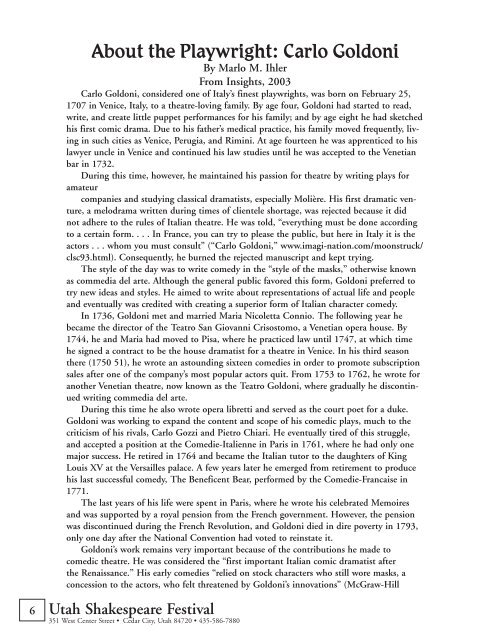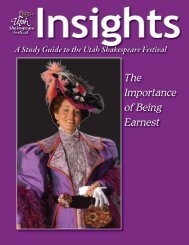The Servant of Two Masters - Utah Shakespearean Festival
The Servant of Two Masters - Utah Shakespearean Festival
The Servant of Two Masters - Utah Shakespearean Festival
You also want an ePaper? Increase the reach of your titles
YUMPU automatically turns print PDFs into web optimized ePapers that Google loves.
6<br />
About the Playwright: Carlo Goldoni<br />
By Marlo M. Ihler<br />
From Insights, 2003<br />
Carlo Goldoni, considered one <strong>of</strong> Italy’s finest playwrights, was born on February 25,<br />
1707 in Venice, Italy, to a theatre-loving family. By age four, Goldoni had started to read,<br />
write, and create little puppet performances for his family; and by age eight he had sketched<br />
his first comic drama. Due to his father’s medical practice, his family moved frequently, living<br />
in such cities as Venice, Perugia, and Rimini. At age fourteen he was apprenticed to his<br />
lawyer uncle in Venice and continued his law studies until he was accepted to the Venetian<br />
bar in 1732.<br />
During this time, however, he maintained his passion for theatre by writing plays for<br />
amateur<br />
companies and studying classical dramatists, especially Molière. His first dramatic venture,<br />
a melodrama written during times <strong>of</strong> clientele shortage, was rejected because it did<br />
not adhere to the rules <strong>of</strong> Italian theatre. He was told, “everything must be done according<br />
to a certain form. . . . In France, you can try to please the public, but here in Italy it is the<br />
actors . . . whom you must consult” (“Carlo Goldoni,” www.imagi-nation.com/moonstruck/<br />
clsc93.html). Consequently, he burned the rejected manuscript and kept trying.<br />
<strong>The</strong> style <strong>of</strong> the day was to write comedy in the “style <strong>of</strong> the masks,” otherwise known<br />
as commedia del arte. Although the general public favored this form, Goldoni preferred to<br />
try new ideas and styles. He aimed to write about representations <strong>of</strong> actual life and people<br />
and eventually was credited with creating a superior form <strong>of</strong> Italian character comedy.<br />
In 1736, Goldoni met and married Maria Nicoletta Connio. <strong>The</strong> following year he<br />
became the director <strong>of</strong> the Teatro San Giovanni Crisostomo, a Venetian opera house. By<br />
1744, he and Maria had moved to Pisa, where he practiced law until 1747, at which time<br />
he signed a contract to be the house dramatist for a theatre in Venice. In his third season<br />
there (1750 51), he wrote an astounding sixteen comedies in order to promote subscription<br />
sales after one <strong>of</strong> the company’s most popular actors quit. From 1753 to 1762, he wrote for<br />
another Venetian theatre, now known as the Teatro Goldoni, where gradually he discontinued<br />
writing commedia del arte.<br />
During this time he also wrote opera libretti and served as the court poet for a duke.<br />
Goldoni was working to expand the content and scope <strong>of</strong> his comedic plays, much to the<br />
criticism <strong>of</strong> his rivals, Carlo Gozzi and Pietro Chiari. He eventually tired <strong>of</strong> this struggle,<br />
and accepted a position at the Comedie-Italienne in Paris in 1761, where he had only one<br />
major success. He retired in 1764 and became the Italian tutor to the daughters <strong>of</strong> King<br />
Louis XV at the Versailles palace. A few years later he emerged from retirement to produce<br />
his last successful comedy, <strong>The</strong> Beneficent Bear, performed by the Comedie-Francaise in<br />
1771.<br />
<strong>The</strong> last years <strong>of</strong> his life were spent in Paris, where he wrote his celebrated Memoires<br />
and was supported by a royal pension from the French government. However, the pension<br />
was discontinued during the French Revolution, and Goldoni died in dire poverty in 1793,<br />
only one day after the National Convention had voted to reinstate it.<br />
Goldoni’s work remains very important because <strong>of</strong> the contributions he made to<br />
comedic theatre. He was considered the “first important Italian comic dramatist after<br />
the Renaissance.” His early comedies “relied on stock characters who still wore masks, a<br />
concession to the actors, who felt threatened by Goldoni’s innovations” (McGraw-Hill<br />
<strong>Utah</strong> Shakespeare <strong>Festival</strong><br />
351 West Center Street • Cedar City, <strong>Utah</strong> 84720 • 435-586-7880

















